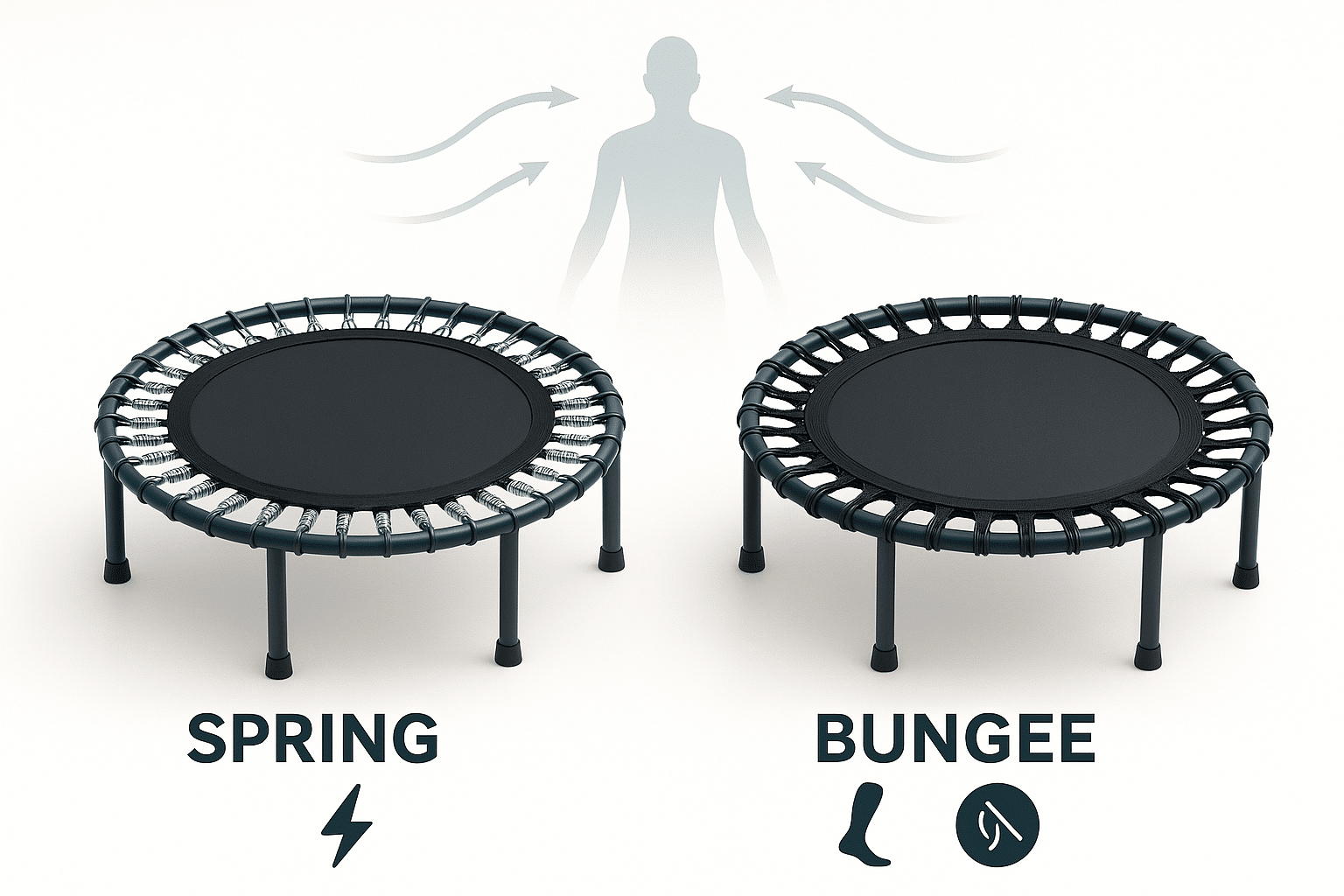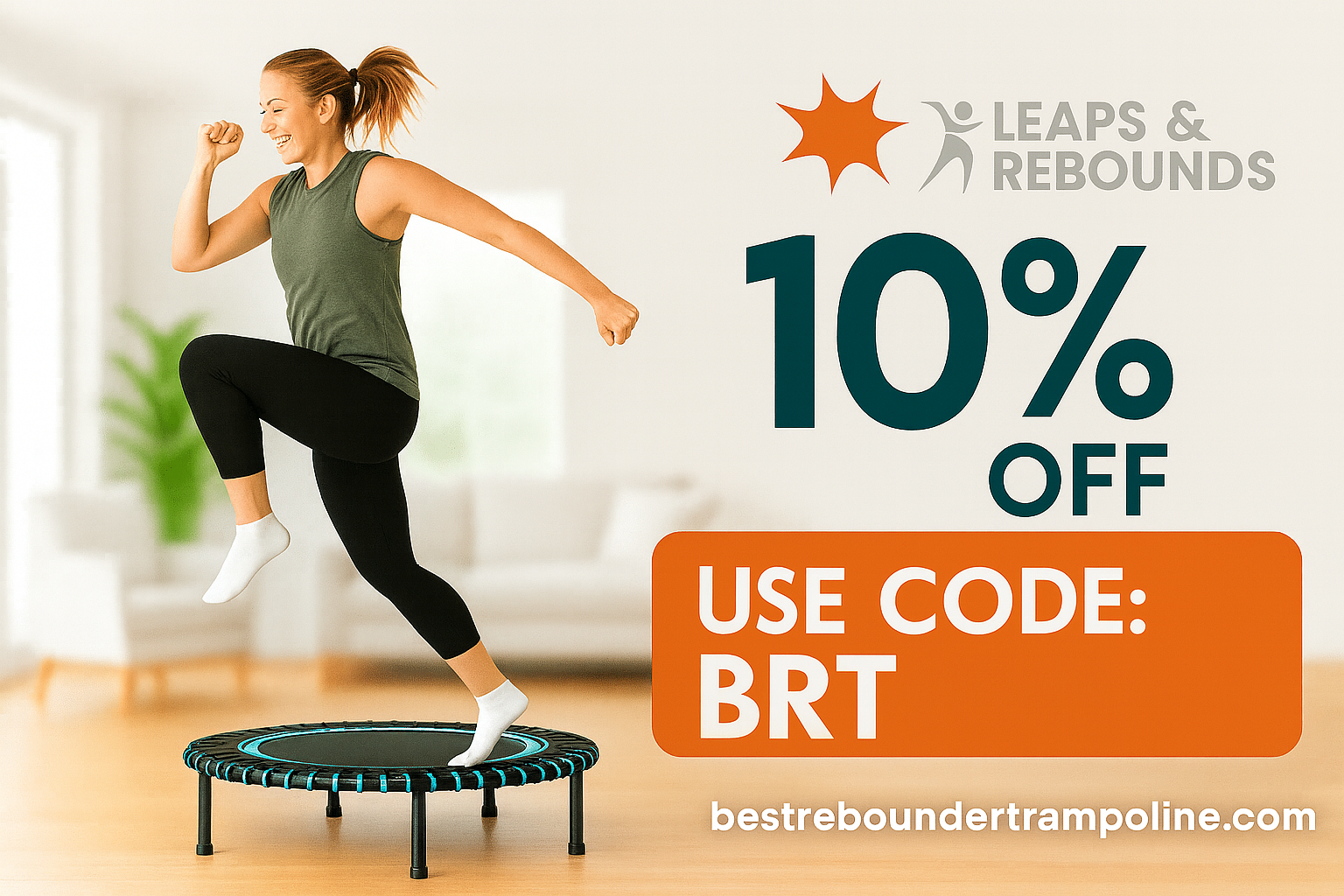The Short Answer (And Who Each Type Is For)
If you want a quick, snappy bounce for fast choreography and HIIT, spring rebounders return energy faster and feel firmer. If you want a deeper, more progressive bounce that’s kinder to sensitive joints and apartment-friendly, bungee rebounders are typically the win. That’s also why I personally gravitate to bungees—the bounce feels progressive and kinder to my knees and hips, and I can go longer without irritation.
Mechanically, brands themselves frame it this way: bungees = slower, softer upward return; springs = faster recoil that favors higher tempos. Rebound Fitness
Quick chooser:
- Springs → fast tempo, punchy HIIT, “runner’s” cadence.
- Bungees → joint comfort, quieter homes, longer sessions.
Need help? Read our rebounder for adults buying guide.
How Each System Works: Mechanics, Recoil, and Feel
Bounce profile & tempo: quick lift vs deeper sink
Springs store and release energy quickly—great for quick repeats and sprint-style intervals. Bungees “sink” a bit more and take a beat longer to bring you back up, which is exactly what makes them feel cushier and more controlled. Even a spring-brand explainer concedes bungees yield fewer bounces in the same time window because of that deeper sink (i.e., slower cycle). Needak.com
From the AngieFitnessTV breakdown, bungees are described as “really kind and gentle on the joints,” with a deeper bounce and often larger bounce space (e.g., 48″)—great for comfort and control.
Impact on joints & fatigue
On my body, bungees feel more joint-friendly and let me keep form without bracing. That lines up with community feedback (bungees = smoother, quieter; springs = firmer, sometimes “harder on joints” depending on the person and model). Reddit+1
Noise, footprint, and portability
If you train in a shared space, noise matters. Bungees are routinely reported as near-silent; springs can squeak (often fixable with a tiny dab of lube at contact points). Reddit
Mat diameter also changes the experience: ~39″ vs 48″—larger mats give you more bounce space and a plusher feel, but require more room. Angie explicitly highlights the bigger surface as a comfort advantage.
Performance by Use Case
HIIT, runners, and fast choreography (why springs shine)
If your workouts rely on fast elastic return—Tabata, sprint repeats, running drills, or tight choreo—springs feel “snappier” and keep cadence high with less effort per rep. This is the same angle brands use when they recommend springs for faster-tempo fitness. Rebound Fitness+1
That said, I’ve pushed HIIT on firm bungees by selecting stiffer cords—intensity is there, just with a different rhythm and a bit more knee-friendly give.
Rehab, seniors, and sensitive joints (why bungees win)
If the priority is comfort, control, and time-on-device, bungees’ deeper, softer rebound is easier to sustain and often feels better for cranky knees, hips, or backs. Angie emphasizes this “gentle on the joints” quality, which mirrors my own experience.
Apartment-friendly training (quiet matters)
Noise is the apartment deal-breaker. The crowd wisdom: bungees are quieter by nature; springs can squeak unless maintained. Reddit
Setup Variables That Change Everything
Bungee strength, mat size, and your bodyweight
Bungee rebounders come in strength levels; going one level firmer can make a bungee feel notably sportier (common community tip). Pair that with mat diameter (39″ vs 48″) and your bodyweight, and you can dial in bounce depth vs control. Reddit
Form basics that protect your knees
Whatever you buy, technique matters: soft knees, stacked ribs, active core, short “heel kiss” landings. Those cues keep forces friendly and your bounce symmetric (also echoed by coaches across the video space). Want to know the best rebounder for bad knees?
Durability & Maintenance
Springs vs cords: longevity, squeaks, and replacements
Steel springs generally outlast elastic cords; bungees will need periodic replacement as they lose tension or fray—this shows up regularly in user reports. Reddit
In my experience, that’s the main trade-off: bungees treat my joints better but I accept cord replacements over time; springs need occasional lubrication to tame squeaks. Reddit
Safety & claims (about “toxic particles” from bungee wear)
You might see warnings that worn cords shed “toxic dust.” I couldn’t locate robust, independent evidence for a meaningful airborne exposure risk during home bouncing. Given the potential marketing bias (spring-forward brands) and lack of solid data, I wouldn’t use this as a deciding factor. Practical tip: keep your unit clean, replace frayed cords, and ventilate normally.
Brand Landscape (Neutral Overview)
You’ll frequently see Bellicon and JumpSport (bungee), Leaps & Rebounds (bungee), Needak (springs), Cellerciser/Cellercise (springs), Maximus/Fit Bounce Pro (both types depending on model). Choose based on mat size, weight rating, folding, handlebar options, and your noise/durability priorities. (Even vendor content agrees bungee = quieter/softer; springs = faster tempo.) Rebound Fitness+1
“Spring vs Bungee Rebounder for Lymphatic Drainage”
Here’s the straight talk: rebounding is widely marketed for lymphatic benefits, but high-quality comparative evidence (bungee vs spring) is lacking. Science-based writers caution that “detox” narratives are often overstated; overall evidence quality is low. McGill University
What does matter for lymph flow in practice? Consistency and comfort. A bounce style you can sustain for 10–15+ minutes without joint irritation is more likely to support general circulation/lymph movement than the suspension type itself. On that front, many people (me included) find bungees more comfortable for longer, steady sessions. If you prefer faster, punchier intervals and they’re the only way you’ll stick to it, a spring model is perfectly fine—just keep impact technique clean.
Bottom line: pick the device that keeps you consistent; don’t expect medically proven drainage “superiority” of one type over the other.
Want to know the best rebounder trampoline for lymphatic drainage?
FAQs
Is a bungee rebounder better for bad knees?
Often, yes for comfort—softer, deeper bounce feels gentler, which is why I favor bungees. Your form and mat size still matter.
Can you do HIIT on a bungee?
Yes—choose firmer cords and focus on crisp landings. Springs still have the edge for ultra-fast cadences.
Which lasts longer—springs or bungees?
Springs (steel) tend to outlast cords; bungees require periodic replacement.
Which is quieter for apartments?
Bungees. Springs can squeak unless maintained.
A quick side-by-side (use-case → pick)
| Use-case | What you’ll feel | Likely pick |
|---|---|---|
| Fast HIIT / runners / quick choreography | Snappy recoil, higher cadence | Springs |
| Joint-friendliness / rehab / long steady sessions | Softer, deeper, controlled | Bungees |
| Apartment / noise-sensitive homes | Quieter by design | Bungees |
| Lowest maintenance over years | Steel coils last | Springs |
| Customizing feel | Cord strengths & mat sizes matter | Bungees (easy tuning) |
In my case, I get the most “stick-with-it” time from a bungee—firm cords keep it sporty, but it still treats my joints better than any spring unit I’ve owned.
Sources you can skim
- Vendor explainers agreeing on the core mechanic (bungee = slower/softer, spring = faster/tempo): Rebound Fitness. Rebound Fitness
- Community experience on noise/feel and maintenance tips. Reddit+1
- AngieFitnessTV notes (gentle on joints, deeper bounce, larger mat comfort).
- On lymphatic claims: caution about “detox” narratives; evidence is limited. McGill University

Conclusion
Both systems work—what you value decides. If you live for speed and sharp rebounds, springs feel electric. If you want quiet, cushioned, longer sessions (and that’s what keeps you consistent), go bungee and pick the right cord strength + mat size. That’s why I roll bungee most days: I still get a fitness-level bounce with firmer cords, but my joints thank me afterward.

Customer Engagement Manager
Michael Carter has been with Best Rebounder Trampoline for over 10 years, leading our customer engagement team with dedication and empathy. He has a background in health and wellness coaching and is committed to helping our readers achieve their fitness goals with personalized support and advice.



